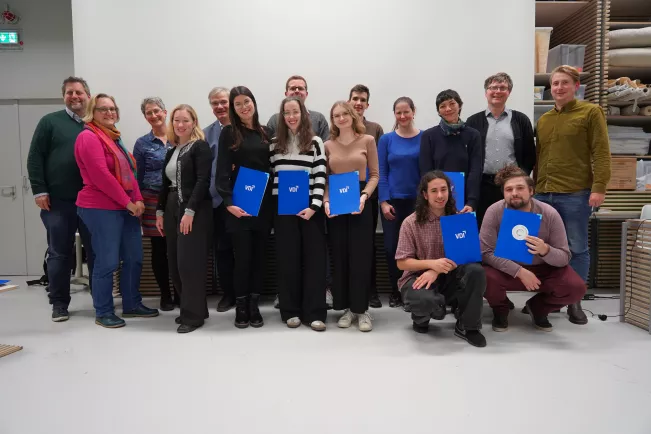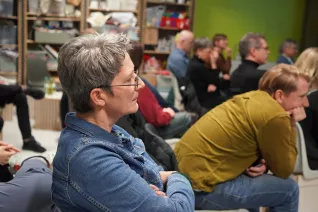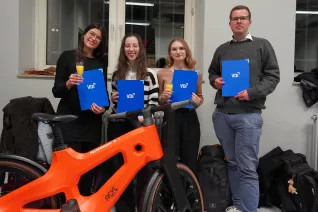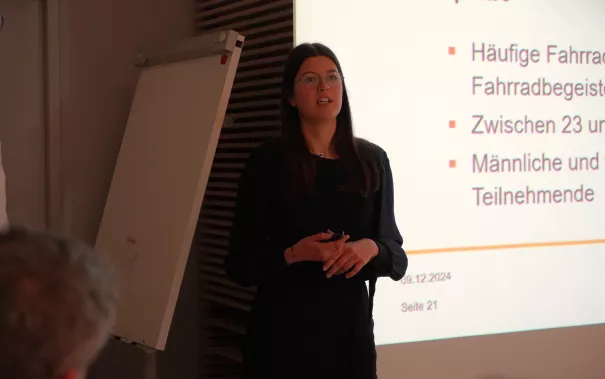Communications and Marketing
Scholarship Regenerative Economy and Socio-Ecological Change: Students present results

"The students worked intensively on their topic for several months alongside their studies. Through the interdisciplinary exchange, thinking in process chains and the practical relevance of the task, they have acquired initial knowledge of project management and applied research," says Professor Sigrid Leitner from the Chair of Social Work/Social Policy at TH Köln.
Professor Stefanie Meilinger from the International Centre for Sustainable Development (IZNE) at H-BRS adds: "All of the funded teams have impressively demonstrated how valuable the integration of different specialist perspectives from engineering, economics and social sciences is for working on a complex topic. Finding a common working language, bringing together different approaches and developing a solution - these skills will be very helpful in further studies and, above all, in professional life."

Brown algae - from plague to raw material
The first team presented its potential analysis on the utilisation of brown algae in the Caribbean. Based on an analysis of the social, political and economic risks as well as the opportunities arising from the abundance of algae for the affected countries, the students developed a process chain: from harvesting the algae to processing, product extraction and sale through to the utilisation of the residual biomass for energy. The specific challenges in all process steps were explained and finally recommendations were formulated in four areas: Promoting social acceptance through public relations work, strengthening regional cooperation, intensifying international cooperation and creating sustainable capacities for collecting, processing and storing the algae.

Igus Bike: Material development, life cycle assessment and social acceptance
The second sponsored student team focussed on the Igus Bike. The bike is made almost entirely of plastic, and the main components are currently made from 50 per cent recycled material. The team initially focussed on material development in order to further increase the recycling rate in the future. This included creating a material database with suitable plastics for use in the bicycle. With the help of the so-called Life Cycle Assessment, the students looked at the life cycle assessment by analysing the carbon dioxide emissions over the entire life cycle and comparing the values of the Igus bike with those of a typical bicycle made of aluminium and steel. Finally, the attitudes, opinions and concerns of the target group towards bicycles made of recycled plastic were analysed in eight qualitative interviews and a quantitative survey with 130 interview partners. Key findings: Concerns were expressed about stability and durability. The sustainability of the material and the eye-catching design were cited as positive aspects. The decisive purchasing criteria are price, quality, stability, design and weight.

Commons: Rethinking communities
The third student team focussed on commons - jointly used resources such as Wikipedia, forests, energy production and use or public space. The focus was on the question of how the perspective of the commons can promote sustainable cooperation between the public sector and self-organised initiatives. The project group developed a possible approach to this with the construct of commons-public partnerships as a legal instrument. Through interviews with four local groups from Cologne, Bonn and Bergisch Gladbach as well as employees of the City of Cologne, the students gained practical insights into the opportunities and challenges of potential collaborations. The project team organised an event with around 30 participants in order to network the stakeholders and promote exchange. Other knowledge transfer measures included participation in this year's ‘Day of Good Living’ in Cologne and the creation of a dedicated Instagram channel.
Establishing a permanent scholarship programme
‘The positive experiences of the students, the supervising professors at the two universities and the participating partners from business, local authorities and international organisations have strengthened our desire to continue the scholarship in the future. To this end, we are in contact with new potential sponsors,’ explains Suanne Weisheit, mentor of the scholarship and founder of rethinking organisations.
About the scholarship
The nine scholarship holders each received 500 Euro per month and were funded for a period of six months. The project groups were supervised by professors from both universities. On the part of TH Köln, scientists from the chairs of Agricultural Machinery Technology, Social Work and Circular Economy were involved. The H-BRS researchers are based at the chairs of Digitalisation/AI and Sustainable Engineering. The VDI Cologne District Association and rethinking organisations are involved in the field of circular economy and the Gothaer Foundation supports research and teaching on socially relevant developments such as climate and environmental protection.
Impressions of the event










Kontakt

Stefanie Meilinger
Professor for Sustainable Technologies, esp. Energy Efficiency and Renewable Energies, Director of the International Centre for Sustainable Development (IZNE), Department Engineering and Communication (IWK)
Research fields
Location
Sankt Augustin
Room
F 321
Address
Grantham-Allee 20
53757 Sankt Augustin
Telephone
+49 2241 865 718
Rainer Herpers
Scientific Director of the Graduate Institute, Professor for Computer Vision, Computer Graphics, Multimedia Applications , Director of the Institute for Visual Computing, Director of the Department of Informatics and Data Science at PK NRW
Research fields
Location
Sankt Augustin
Room
F 427
Address
Grantham-Allee 20
53757, Sankt Augustin
Telephone
+49 2241 865 217Location
Sankt Augustin
Room
C 275
Address
Grantham-Allee 20
53757, Sankt Augustin
Telephone
+49 2241 865 217








